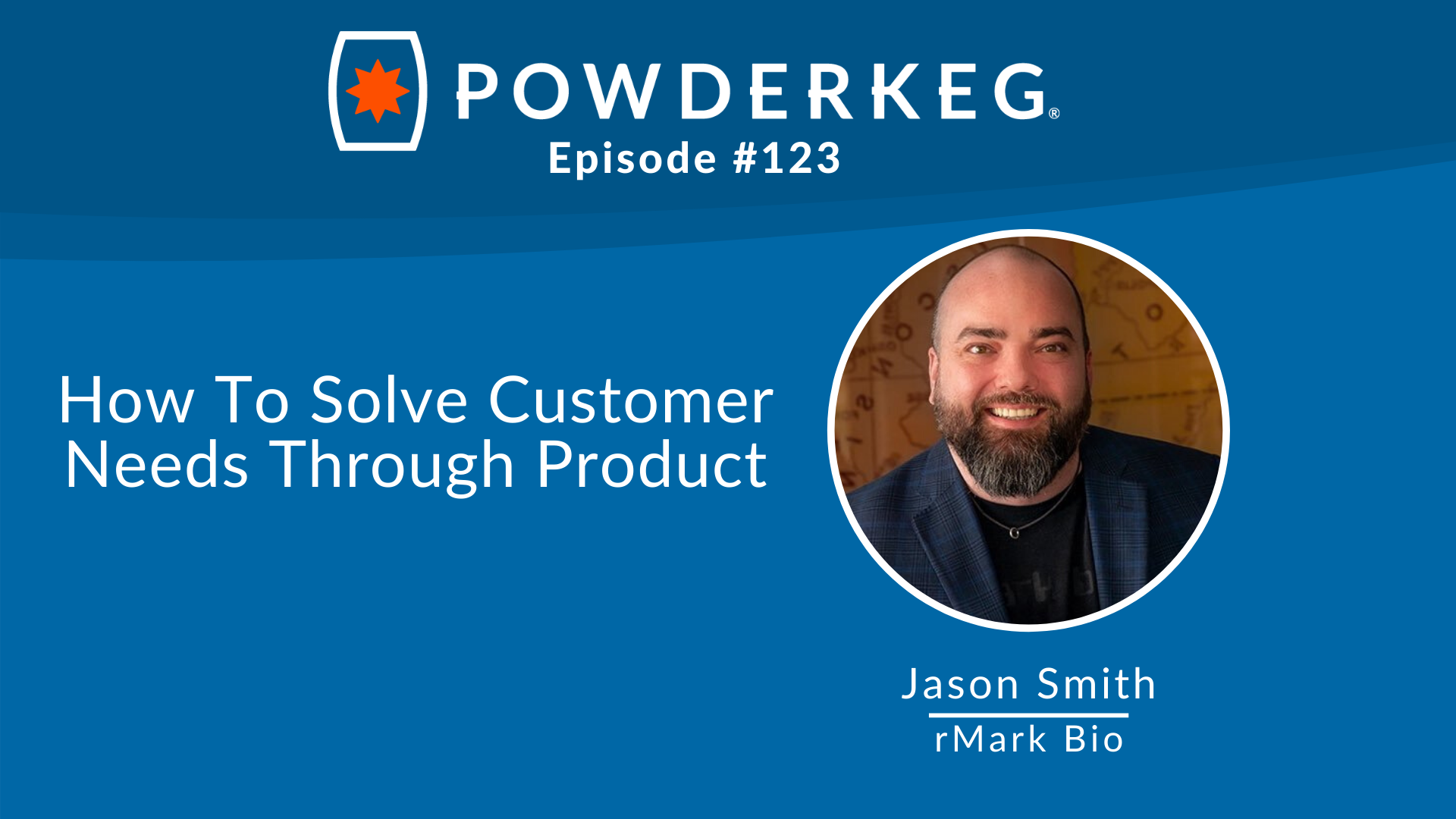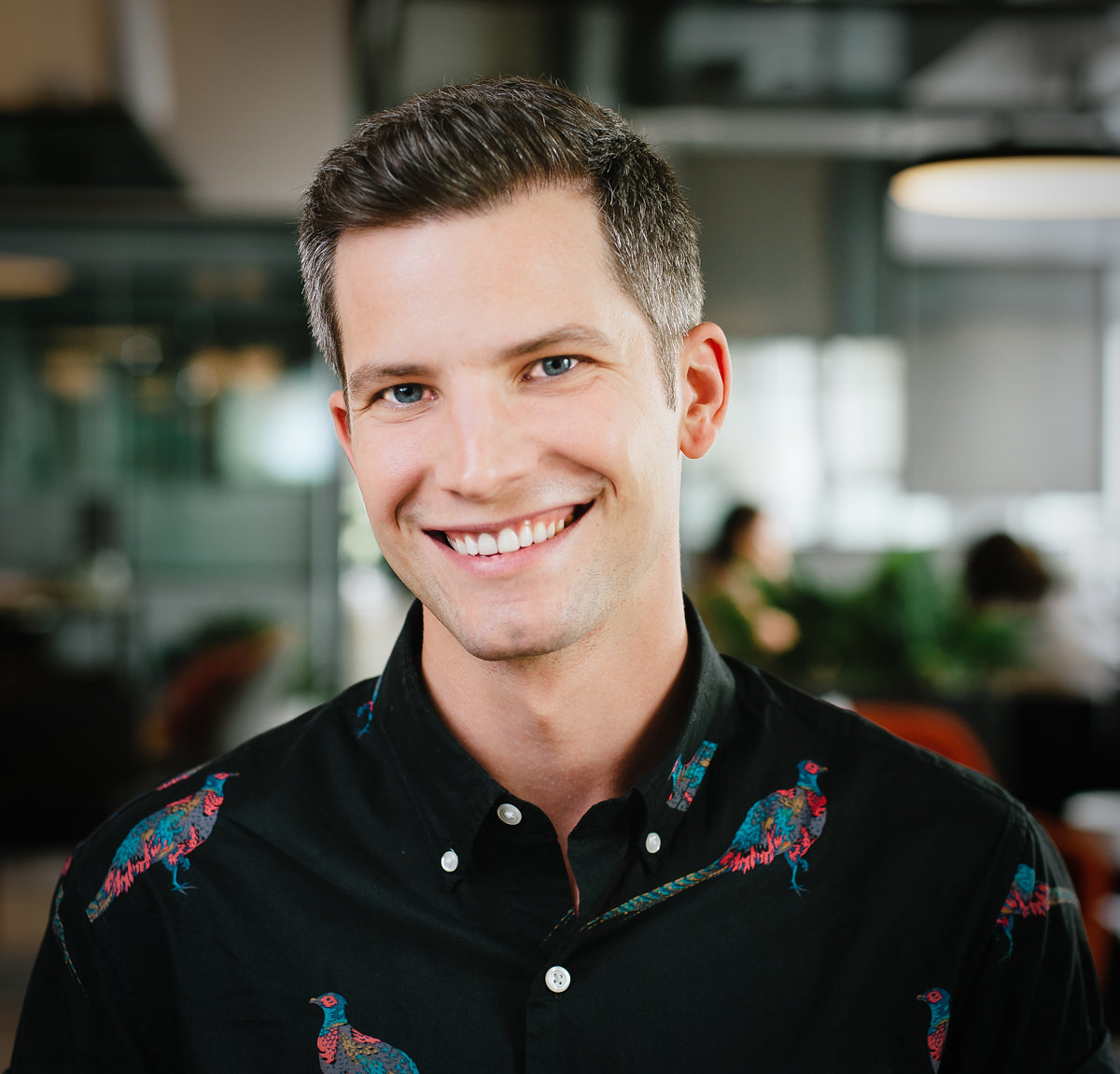Most, if not all, customers want better ways of solving their problems, whether it be with a service, an experience, or even a product. Being able to identify the real problem our customers experience every day can be the natural part of figuring out how to build a great product. The challenging part is being able to answer that problem or need with the right solution. When creating a great product, as entrepreneurs, we have to take a look at what our customer needs and what their problems are. But the challenging question we have to answer is, “How do we solve it?”

For today’s episode of the Igniting Startups Podcast, we want to shout out to our friends over at Stout Street Capital, for inviting us to this past year’s UNMET 2019 conference. And for setting up this awesome opportunity of speaking with Jason Smith, co-founder and CEO of rMark Bio. rMark Bio, a personalized business intelligence solution that empowers life science companies to identify and partner with clinical/academic scientists.
Jason is a leading-edge technologist and product executive with over 19 years of industry experience where he has held numerous positions in early-stage companies, large multinational corporations, and venture capital incubators, yielding a rich professional background.
Throughout this episode, you’ll have the opportunity to hear how Jason and his co-founder were able to overcome the challenges of healthcare and pharma tech, their focus on building a great product platform for customers, and his current role as co-founder and CEO of rMark Bio. Find out more on how Jason and his team are disrupting the pharmacy industry with their data intelligence platform, rMark Bio, on this episode Igniting Startups Podcast. Tune in for more!
In this episode with Jason Smith, you’ll learn:
- Finding and solving the needs of your customers through product
- Great tips on raising capital with the right VC’s
- Jason’s personal outlook on finding great tech talent in Chicago
- About the growing companies and investments happening in Chicago tech
- Jason’s visions for the future of rMark Bio in Pharma Tech
Please enjoy this conversation with Jason Smith!
- Listen to it on iTunes.
- Stream by clicking here.
- Download as an MP3 by right-clicking here and choosing “save as.”
Jason Smith quotes from this episode of Igniting Startups:
Links and resources mentioned in this episode:
Companies and organizations:
Venture capital firms:
Conferences:
Incubators and Accelerators:
People:
Did you enjoy this conversation? Thank Jason Smith on Twitter!
If you enjoyed this session and have a few seconds to spare, let Jason know via Twitter by clicking on the link below:
Click here to say hi and thank Jason on Twitter!
COMMENTS?
What stood out most to you about what Jason Smith shares in this podcast?
For me, it’s finding and solving the needs of your customers through product.
You? Leave a comment below.
WANT MORE?
To subscribe to the podcast, please use the links below:
Click Here to Subscribe via iTunes.
Click Here to Subscribe via RSS (non-iTunes feed).
To download the PDF file for the full transcript of this podcast, please use the link below:
Click Here to Download PDF file
If you have a chance, please leave me an honest rating and review on iTunes by clicking here. It will help the show and its ranking in iTunes incredibly! Thank you so much!

Episode Transcript
Jason Smith 00:00
raise enough to understand how to pull yourself through what’s affectionately known as pilot hell. You know, as with any large b2b enterprise and farmer in particular, you can end up in reoccurring pilots. And while that looks good, because you’re making a little bit of money, you’re not actually pulling them through to a license and really validating your business. And that sometimes takes a little bit more runway than you think it is. And those pilots are not as revenue generating, so that can really get you and you’ll be going back to a market without any real metrics other than, yeah, I have another pilot resigned for another six months.
Nick Jamell 00:46
There pattycake fans, Nick here from the powderkeg team. And this is episode 123 of powderkeg. Igniting startups, the show for entrepreneurs, leaders and innovators building remarkable tech companies in areas outside of Silicon Valley. And today, we’re going to be looking at an interview that I had the chance to do at last year’s unmet conference in Denver, Colorado. There, I had the awesome opportunity to speak with Jason Smith, co founder and CEO of our mark bio, a personalized business intelligence solution that empowers life science companies to identify and partner with clinical and academic scientists. And Jason is a leading edge technologist and product executive with over 19 years of industry experience. He has held positions in early stage companies, large multinational organizations, and venture capital incubators during a rich professional background. And through this wide range of experience leading product teams, he’s helped create many innovative products, especially when he’s working on right now with our mark. And using sound technical strategy, product development and operations, he has been able to make these big success. And he talks about how he does that, and also how he fosters a good company culture as well. So there’s a lot to learn from this interview, definitely listen to what he has to say, because he’s one smart guy. So let’s get started. Jason, thanks for coming on the podcast today. Great, thank you. Yeah. And we also have clay here as well, helping me to facilitate the conversation. And really, Jason would just like to start off with understanding how you got into entrepreneurship and what it was that sparked your interest and really helped you launch into this journey?
Jason Smith 02:21
Absolutely. So I worked. While I was going to school at large companies, I started my career at groups like IBM ATI research, I was recruited out by a startup in Seattle in early 2000s. and fell in love immediately with the startup culture and the northwest. That company did not work out. But myself and two other scientists left at the end and went on to form a group called crypto cybernetics, which we built up in up selling off. And ever since then, I just had the I love being entrepreneur love, be able to do so many different things. After we’ve had that sale went on to become an angel investor in the market. Through that I end up help building and selling another company, and just fell in love. It just reinforced every single time how much I love being on the front line to solve those problems. And you know, work with really smart, passionate people that even during tough times, we’re all there for one costs. And I spent some time in BC. And that’s actually where I met my co founder. He was through our wife’s at the time, we got dragged to some events at a bar. And we’re the only two guys at this event. So we end up sitting at the bar and you know, kind of hit it off over data and, and vodka and football. And we you know, so we really got along well, we became personal friends, Dr. Lett, Becker was finishing his postdoc at University of Washington, in, in biochemistry. And one day I was talking about some of the companies were investing in while I was on the VC side. And he kind of, you know, mentioned how he would really wish he could get his research in front of Pharma. And the problem was he doesn’t have the reputation we had really cool science has some really good findings that could really accelerate this. And that was the ahava he and I to go, what if we get socialized a science? What if an objective way we can look at what is the science coming out of the lab and how that in a university and match that against the pipeline or needs of a pharma company in real time. And that was the AHA spark that eventually led to what our market is now.
Nick Jamell 04:19
That’s awesome. And so it kind of cuts through some of the having to build a name for yourself. If you’re doing really cool things. In your research, you can now get connected basically through what you’ve built. Yeah, that’s the whole Yep. Awesome. And so what’s been your biggest challenge then and getting started with our market and getting this going? Like, where have you run into obstacles and had to overcome those?
Jason Smith 04:44
Well, the first one is I don’t come from this industry. So I’m not a I am not a healthcare person. I’ve never been in life sciences, or any of that. So when we decided I was early 2015 I was helping a friend of mine build his group obviously gets sell it off, went through some ad sale, trying to find you what I do next in my life live. And I had been bootstrapping this idea behind the scenes kind of working on a little bit. He moved to Chicago to take after he finished his postdoc to university, Chicago. And we spoke to some friends of ours in industry. And I said, Yeah, this is actually a real problem, but broader than what you’re just the research that we’ve brought in the platform. So the first real challenge for me was a I needed to, I sold my house, my car, packed up my dog in a U haul truck and drove Chicago to launch it and spent the first six months interviewing and meeting anyone in the pharma industry. So we knew we had the algorithms, we didn’t know the product to put around it that you’d actually want to touch every single day that would make a difference in the business, and the operations of that business. So really understanding what were the real pain points, everyone can say? Yeah, I wish I was more connected to people. I wish I had better data intelligence, and I wish I could take better actions on them. Well, what does that really mean for the user to want to pick up that product and login everyday to our tool, and use that as a decision? So that was a real, the first real challenge for us was understand what we actually needed to build. Once we had that? How do you get in front of Pharma? You know, these are, these are very large, very complex organizations that you have to navigate. And as a small company, that was probably and will continue to be, but definitely the early days was one of the hardest challenges.
Nick Jamell 06:22
I bet. I mean, Lilly is a big company in Indianapolis. And I’ve stopped asking people if they know someone that I know that works at Lilly, because it’s just like, No, not a chance.
Clay Gordon 06:33
Well, I guess, Jason, thank you for your time. One question that I had had were Why do large pharma companies have trouble finding these research?
Jason Smith 06:42
It’s, it’s not that they have trouble finding the research. It’s, there’s so much of it out there, how do they filter so they can go pull all the data we can pull from all the public sites? You know, we signed third party agreements as they’re buying the data from these other organization? It’s how do you take all these disparate datasets to paint the picture of what a researcher is doing? Or what a physician who’s running a clinical trial or physician with a patient population that needs that therapeutic? It’s a broader view across that data, and then knowing what are the business objectives? Now, one department may need it for this reason where another department wants to use a position for advocacy verse clinical trials for us r&d, those are different objectives, and it gives you different views of the data. That’s the real challenge is how can they by hand pull that data together? And the answer is, it’s very hard to do that. So they pay a lot of service providers to try to help them. Our tool is meant to break that down and say, well, we can look across all that data in real time. And our machine learning and our AI pieces can actually help you understand based on business objective, have team or department a versus Team or department be in the same organization? What are the right people you should be engaging with? And why and what should you engage on? And then how do we measure that? And that ability to look across the data and make those recommendations, I think is the efficiency that is just hard to do by, you know, by human hand?
Clay Gordon 08:03
I’m kind of curious, your experience kind of entering Pharma. And you know, everything that I’ve heard about any government agency or any large corporation is just the relationships take a long time, has that been your experience? Or is there any kind of shortcut to expedite the process through large pharma?
Jason Smith 08:20
I know that there are shortcuts, the we’ve been fortunate, so we’re part of matter out of Chicago. So healthcare community, and that space in their entire charter is to break down the barriers between these large healthcare companies, whether it’s payers, providers, pharma companies, device companies, to the startups. So that really gave us a leg up because those companies are trying to find startups to solve the problem. And they know you’re a startup, so you don’t have to be perfect. If that’s, you know, shortcut, but it definitely helped in the early days to be able to have very candid conversations with the leaders inside different organizations to say, this is where we’re headed. What do you think, and, you know, get open feedback, that was a huge, I’d say win for our mark, because we got a lot of feedback very quickly, and we’re able to adjust it and modify our product so that when we were ready to go to market more broadly, we at least had 80% of the pain points somewhat solved and accounted for or could speak to why we didn’t have the other ones.
Clay Gordon 09:22
Do you since your background has been in VC and companies as well? Do you have any advice for companies maybe looking to enter into this sector that you can give them trying to raise money in that I would say the pharma industry
Jason Smith 09:36
does so raise more than you think? So we all we all have this thing and I know that’s the whole VC is raised more it’s always gonna be a rainy day. This is very different. This is these sales cycles are extremely long, and raise enough to understand how to pull yourself through what’s affectionately known as pilot help With any large b2b enterprise and pharma in particular, you can end up in reoccurring pilots. And while that looks good, because you’re making a little bit of money, you’re not actually pulling them through to a license and really validating your business. And that sometimes takes a little bit more runway than you think it is. And those pilots are not as revenue generating. So the idea that you’re going to have a six month pilot and a convert to a license, that is not always the case. And if you’re counting on that, and your revenue, and you’re not right in, you’re not raising for that not to happen, that can really get you and you’ll be going back to a market without any real metrics other than you have another pilot resign for another six months. And that makes your valuation and your argument you want to have for value really hard. So do it early, and it’s worth a percentage is early on to give up to make sure you have a business in a year from now.
Clay Gordon 10:49
Well, I mean, I really, really liked what you do. I’m very curious, you know, what is the future of our mark bio? What is? What does the future look for the next three years?
Jason Smith 10:58
Yes, so we really want to, we’re been predominately focused on pharma will continue to, we really want to focus now on med devices and early biotech. But as we’ve been training new models and taking more data in, it’s really helping make more strategic recommendations inside of these organizations, you know, you can we look broadly across what are the right to go to market strategies for therapeutic and certain key markets and we make recommendations and then monitor that and get smarter about that. That’s the area that we’re really excited to grow in is your kind of taking our business intelligence up a few layers within the organization and more broadly throughout the entire organization to help them make better decisions across the board.
Clay Gordon 11:38
And it looks like Chicago is probably a great place to have this company. It
Jason Smith 11:42
is so you know, there was a outside of love already being in Chicago, we had really a few key areas, he had Boston, the jersey corridor, Chicago and then San Diego. I didn’t want to go to any of those without you know, you want the brain trust initial days, but it’s also our customers are there. A lot of Big Pharma is right in Chicago. So it’s a great place to have people in your backyard that are rooting for you, and you made the right relationships and really pull those through. And then we can worry about expanding on to other markets.
Nick Jamell 12:12
It’s good to be close to your customers. So you can have especially while you’re building to have that feedback loop. Absolutely. For sure. Um, so besides, you know, having that density in Chicago, what’s the general environment like for tech startups? Like is it are their resources and you know, the talent what is? What does that ecosystem like? And how has that helped you to build RMR?
Jason Smith 12:33
It’s been growing Chicago is awesome. When I first got there, there was a little apprehension because it was so a little nascent. And I say that coming from the outside from Seattle, so I have a very skewed view of that world. But when I first got boots on the ground Chicago remind me of when I first got to Seattle, you know, it’s early 2000, it wasn’t like it is now it by any stretch of the imagination. So we’re starting to see that over the last four years, there’s been so much growth and so much tech that investments are really coming into Chicago now, which and there’s been a few wins and a few small wins where that group is turning back around and reinvesting which is what you want, not only the capital, but that understanding that leadership from people I’ve been through it staying in the Chicago market. So we see a lot of growth potentials become a lot easier to recruit. Because mainly because some of the larger companies are coming back to Chicago, because the quality of life and the cost of living is so much cheaper than the west coast that they’re you know, you see Facebook, you see Google moving massive amounts of people there, that helps everyone in that community and we’re, you know, groups like matter 1871 Those were also huge wins to really prop up that community helped us grow faster.
Nick Jamell 13:45
Awesome. I mean, do you have any questions?
Clay Gordon 13:49
I think one other one, when you look at I would say investors as you guys to scale, you know, what, what do you look for in investors on the VC? Because from what I can tell, you have a lot of interest on the on the VCs, you can kind of pick and choose which ones are more aligned. So what do you look for in a VC,
Jason Smith 14:05
your word is perfect alignment. So we we have to be pretty careful that we don’t get sucked in, we get sucked into a lot of healthcare VCs that we don’t align with. Because healthcare is such a broad term. You know, we’re very, we have a very large market and we have 15 I think the last call actually sells $19 billion market opportunity in our space that we plan, but it’s somewhat niche. So you have to really understand it. So for us, it’s really investors who can answer a question around Do you know how sale excuse me scale a b2b enterprise SAS business? Can you help us they’re great. Can you help do that in pharma or life science industry even better, and it’s got to be one of those two, it’s really focusing on that that healthcare life science to understand the complexities of that world. It can be broader healthcare, we just we tried to narrow that out proved filtered out pretty quickly because we’re also not a fit for that and and vice versa. So those are the things when we’re looking for the next round of VC is, can they really have they done this before in the in the market that we’re selling into? And therefore, can they help us scale that?
Clay Gordon 15:10
Well, I guess for the listener that’s trying to get more information on our mark bio, where can you direct them to get more information? Yeah,
Jason Smith 15:18
check out our more bio.com. And there’s forms there, you’re always welcome. And we can connect with you and definitely update you more about what we’re doing.
Clay Gordon 15:26
Awesome. Jason, thank you so much for your time. Thank you. Appreciate it.
Nick Jamell 15:30
Appreciate it. Thanks again for listening to today’s episode. If you have any thoughts or feedback on the conversation with Jason Smith, feel free to let us know in the comments, we’d love to hear from you. And as always, to be among the first to hear the stories about entrepreneurs, investors and other tech leaders outside of Silicon Valley. Subscribe to us on itunes@powderkeg.com forward slash iTunes. We’ll catch you next time on powderkeg igniting startups




